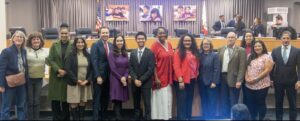Translations: Korean | Spanish
PRESS RELEASE: Oct. 24, 2023
CONTACT: Emily Jo Wharry, UCLA Labor Center, emilyjowharry@g.ucla.edu, (310) 617-5609
LOS ANGELES — On Tuesday, Oct. 24, the UCLA Labor Center and KIWA (Koreatown Immigrant Workers Alliance) published a report examining the labor and housing conditions of immigrant workers in Koreatown’s restaurants.
“Overcooked & Underserved: The Challenges of Koreatown’s Restaurant Workers,” published in partnership with Cal Poly Pomona and San Diego State University, finds that Koreatown’s restaurant workforce faces wage inequality (e.g., low wages, tip theft, wage ceilings) and health and safety risks (e.g., COVID exposure, lack of health insurance).
Key findings include:
- Koreatown’s restaurants and the workers that sustain them are a vibrant part of Los Angeles. Koreatown has a high density of restaurants compared to other neighborhoods in Los Angeles County, with 704 restaurants and eating places employing nearly 9,700 workers. Employment in larger establishments has accelerated, and the vast majority of restaurant workers in Koreatown are immigrants.
- Workers experience low wages and unfair wage practices. 72% of restaurant workers are full-time and 72% earn low wages. Restaurant workers experience unfair practices around tips, and they also face a wage ceiling.
- Koreatown residents face housing risks. Restaurant worker households are at, or near, poverty. They are also housing insecure. Almost half (46%) of Koreatown restaurant workers are burdened by rent, and many live in overcrowded conditions.
“Restaurant workers in Koreatown are vulnerable in multiple, overlapping ways. Behind all of these numbers and data points are individual people and their families, struggling day-to-day but also fighting for a better future,” said Alexandra Suh, executive director of KIWA. “For us, it is crucial that we understand the on-the-ground conditions facing workers in different industries before embarking on any campaign or devising policy. To do so, our trilingual team of organizers hits the streets and meets workers where they are: at home or the workplace.”
“Workers make up the backbone of Koreatown, supporting the thriving commercial and cultural hub that brings locals and tourists from all over. Restaurant workers were seen as essential through the pandemic, and yet, the workforce still faces difficult working conditions,” said Saba Waheed, research director at the UCLA Labor Center. “Our research findings show that workers are grappling with low wages and lack upward mobility, making it difficult to sustain themselves in neighborhoods where they face high costs of living and housing expenses.”
“I really enjoy working in restaurants. I love to see the satisfaction on customers’ faces when I serve them food they enjoy. However, it is difficult to afford the cost of housing in Los Angeles on a server’s wage,” said Eun Sun Choi, a Koreatown restaurant worker. “I believe working as a server is a good job, but it could be a better job if it was more stable.
“To me, serving my community and treating workers with respect goes hand-in-hand with making a profit,” said Brian Lee, the owner of Koreatown business Open Market. “As a small business owner, it is hard to ignore that labor is the highest cost on our balance sheet, but it is a burden and a responsibility for business owners to be able to prioritize the right costs in our business. I am proud to serve people in Koreatown, but worry that small business owners like me will not survive in this neighborhood as more and more big chains move in and the costs of running a business continue to rise.”
Among its findings, the report notes that restaurant workers in Koreatown experience withheld tips, unfair management of tips, or probationary periods before distribution of tips. Recently, in collaboration with KIWA, the U.S. Department of Labor recovered $56,000 for 35 employees at Oo-Kook Korean BBQ, a restaurant in Koreatown where investigators discovered that a manager stole more than $28,000 in tips from workers from April 2021 through October 2022.
Download the report: https://bit.ly/OU-KRW
###
About the UCLA Labor Center:
The UCLA Labor Center believes that a public university belongs to the people and should advance quality education and employment for all. Every day we bring together workers, students, faculty, and policymakers to address the most critical issues facing working people today. Our research, education, and policy work lifts industry standards, creates jobs that are good for communities, and strengthens immigrant rights, especially for students and youth. The UCLA Labor Center is housed in the Institute for Research on Labor and Employment, a multidisciplinary research center dedicated to the study, teaching, and discussion of labor and employment issues at UCLA. Learn more: https://labor.ucla.edu/
About KIWA (Koreatown Immigrant Workers Alliance):
Founded in 1992, KIWA (Koreatown Immigrant Workers Alliance) builds power with immigrant workers and renters to bring about a more just and inclusive Los Angeles. One of the nation’s most established worker centers, KIWA organizes primarily Korean and Latino workers, with a focus on the restaurant and retail industries, in Koreatown and beyond. KIWA aligns strategic worker and community organizing with policy change, leadership development, research, services, and coalition-building. Because of their immense impact on workers’ lives, KIWA also works in the areas of civic justice, economic policy, immigration, housing policy, and land-use reform. Learn more: https://kiwa.org/


